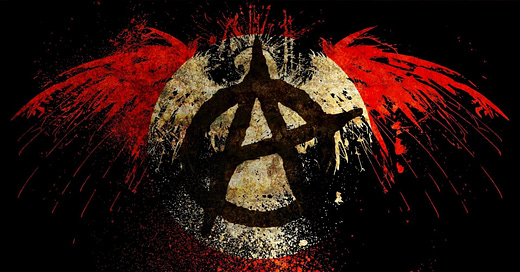You’re probably wondering: What kind of anarchist should I be? Here, I explain why anarcho-capitalism beats anarcho-socialism.*
[ *Based on: “The Right Anarchy: Capitalist or Socialist?,” pp. 342-59 in The Routledge Handbook of Anarchy and Anarchist Thought (Routledge, 2021). ]
1. Two Forms of Anarchism
Definitions
First some definitions. Anarchists are people who think that the best society would lack any monopolistic, central authority structure that would make and enforce laws.
Physical capital is stuff that is used (repeatably) for making other stuff. Like a factory, or construction tools.
Under capitalism, private individuals can control capital. Under socialism, all capital is “collectively controlled”. There are 2 forms of socialism: in state socialism, capital is controlled by the state (boo!). In anarcho-socialism (or “socialist anarchism”, or “social anarchism”), capital is controlled by worker cooperatives.
Anarcho-socialism
Anarcho-socialists envision a society with many worker-owned businesses, with decisions made democratically. There are multiple variations consistent with the general idea (e.g., they could use either representative or direct democracy, the worker assemblies might be tied to small territories or be tied to specific businesses, etc.)
(Is this really “anarchist”? I don’t know, let’s not worry about semantics.)
Anarcho-capitalism
Anarcho-capitalists envision a free market system in which police functions are taken over by competing private security guard companies, and disputes are resolved by competing private arbitrators. Laws would be made/refined by the arbitrators, like the common law.
If you think you know twelve reasons why this is ridiculous, read my book, The Problem of Political Authority, part II. Your objections have already been refuted there. I don’t have time to repeat the whole book here.
The right anarchy?
I’m not arguing about whether anarchy is better than statism. I’m arguing about which form of anarchism is better: capitalist or socialist?
2. The Crime Problem
How are we going to deal with social predators who just want to exploit or hurt others? Or even normal people who make mistakes that can’t be allowed?
The an-cap answer
We’re going to hire security guards. There will be many small security guard firms, because the most efficient size for such firms is probably pretty small. They’ll compete for contracts from homeowners’ associations and business-owners’ associations. So they’ll have to provide service that homeowners and business owners like.
So the security guards will stop the criminals. And competition from other security companies will stop the security guards from abusing people.
Socialist answer #1
An-soc will reduce crime, first, because a lot of crime is caused by drug laws, which we won’t have. Also, crime is caused by inequality and capitalist exploitation of the poor. Also, we’ll teach people to be nice.
Reply: This is unrealistically optimistic. Sure, some crime could have those causes, so it could decline under anarcho-socialism. But a substantial number of criminals are just natural-born social predators. Psychopathy is mostly genetic, it’s not caused by exploitation or inequality, and it’s basically incurable. What are you going to do about the psychopaths?
More broadly, humans are naturally selfish. There are just going to be a lot of times when someone can gain benefits by hurting someone else in a way that shouldn’t be allowed. An-caps smartly recognize the importance of selfishness and try to align incentives to get good results from selfish people. An-socs are uncomfortable recognizing human selfishness.
Socialist answer #2
The “anarchist” society can have community security forces, which will be democratically controlled.
Problem: Um, this is starting to sound a lot like government. Anyway, regardless of whether you consider this “government” or not, why won’t the “community security force” have the same problems as governments have? I.e., the security force can try to exploit the community. Who will protect us from the protectors?
You could say that the security force will be “under the control of the community”. Okay, that’s just democracy. Why won’t that have the same problems that current democratic governments have?
An-caps have a better answer: What restrains the protectors from abusing us is competition from rival protectors.
Where we differ
The difference between capitalists & socialists isn’t that capitalists like selfishness while socialists oppose it. It is that capitalists recognize the fact of human selfishness, while socialists unrealistically pretend that you can do away with it. There is no realistic technique for making people generally altruistic. No one has ever figured out how to do that, so it’s foolish to base a social theory on that idea. What you should do, then, is figure out what social structure best makes use of selfishness for pro-social ends.
3. The Need for Capitalists
Why should we have a class of capitalists, i.e., people who make money by owning capital? Why not instead have all capital controlled collectively by the workers? There are three key things capitalists do:
Risk Acceptance
Business is risky; most new businesses will fail. When they fail, someone has to take the loss. You could have workers collectively take the risk—i.e., use their own money to start businesses, pay for their equipment, etc.—and supporters of anarcho-capitalism would have no problem with allowing this. But few workers in fact want to do that.
That’s why we need capitalists. They will be the people with greater than normal risk tolerance. Of course, along with taking the risk, they also stand in line to get the rewards if the business succeeds; otherwise, no one would do it.
Delayed Gratification
Someone also has to put off immediate consumption to save money so that it can be invested. Again, workers can certainly do that, and an-cap supporters have no objection to that. It’s just that few workers in fact want to do much of that.
But there will be some people with unusually low time preference & hence appetite for saving, and they will become capitalists (or maybe they’ll lend money to capitalists).
Resource Allocation
There are scarce resources, and not every business idea can or should be attempted. Someone has to decide which things should be tried, which ideas should get resources devoted to them. Again, it would be perfectly ok for workers to do that. But few want to do it, and in this case, very few would in fact be competent to do it.
But there will be some people with unusual skill and willingness for this task, and they’ll become capitalists. The ones who succeed will get more resources, so they’ll get to do more of the resource-allocation task. The one who are bad at it will lose their money and hence have to stop doing it.
If resource allocation were decided democratically, by “the community”, progress would stall. Voters would not vote to shut down an inefficient business, for fear of leaving the employees of that business out of work. So inefficient businesses would just continue to operate.
Fair Pay
So that’s why capitalists are useful. Now a different question: does capitalism generally pay people fairly? Or will some kinds of people be systematically underpaid?
I think it pays people roughly fairly, in general (allowing for some mistakes). I support this Fair Pay Principle:
The fair compensation for one’s contribution to a productive activity is at most one’s marginal product.
Your marginal product is how much you contribute to the business’ productivity, compared to the situation in which you leave the company (and are not replaced). If you get paid more than that, then that means that you are a net loss to the business. You could instead be fired and your salary divided to make all the remaining workers overall better off. It is in fact unfair to everyone else to expect to be retained on such terms.
Capitalism tends to result in people’s getting paid roughly their marginal product. Why:
a) If certain employees are getting paid more than their marginal product, the business “should” (from the standpoint of economic self-interest) fire some employees (the least productive ones), and the business’ profits would go up.
b) If certain employees are getting paid less than their marginal product, then the business should (in the same sense) hire some more employees, and their profits would go up.
So the stable equilibrium is where everyone is getting paid their marginal product. That’s why capitalism tends to approximate to this result.
By the way, the income of the capitalists follows a similar logic. If the marginal capitalist gets more benefit than costs from being a capitalist (after properly accounting for the disvalue of risk, delayed gratification, etc.), then more people become capitalists. If the marginal capitalist has net costs, then people start quitting being capitalists. The equilibrium is where marginal benefits balance marginal costs.
4. The Stability Problem
Anarcho-socialism is unstable: it will just evolve into anarcho-capitalism.
Capitalist Competition
Even if you start out with anarcho-socialism, there is nothing to prevent someone from starting a capitalist-owned business. No one will stop that, since there is no state. But capitalist-owned businesses will tend to out-compete worker-owned businesses. That’s partly because most workers don’t want to accept risks or delay gratification (as discussed above); hence, there will be a preference for working for capitalist-owned businesses. Also, capitalists will generally be better at business decisions than worker-owned businesses, so the capitalist-owned businesses will tend to be more profitable. So capitalist-owned businesses will spread.
Internal Dissolution
If you have a worker-owned business, there is nothing (again, because there’s no government) to stop workers from selling their shares in the business to a capitalist. (If the businesses’ bylaws disallow this, they can always vote to change that.) Why might they do that? Because they’d then get an immediate influx of cash. This enables them to have more near-term consumption, and to reduce their risk (the risk of losing their current investment in the business).
Social welfare
Socialists envision worker cooperatives having nice social welfare programs, providing free education and health care, etc. However, since there’s no government, there is nothing to stop a capitalist-owned business from appearing and deciding not to provide any of those services. That business will then outcompete the socialist businesses, which have higher overhead. The capitalist business could then afford to pay workers more, or give customers lower prices, etc. So capitalist businesses grow, while socialist businesses shrink.
Socialists also often envision egalitarian payment schemes, or at least schemes more egalitarian than what a capitalist business would provide. The problem is that capitalist businesses can appear and pay workers in accordance with their productivity. The capitalist can offer the best workers higher pay to draw them away from the socialist business with the egalitarian salary scheme. At the same time, the worst workers will gravitate towards the socialist businesses because they want equal pay. So the capitalists are going to wind up getting the best workers, while the socialists are stuck with the worst, and the capitalist businesses wind up taking over the economy.
5. Conclusion
If you’re going to be an anarchist (which you should; see my book), be a capitalist anarchist. An-caps have a better solution to crime, we properly appreciate the benefits produced by capitalists, and our system is more stable over time. We’re also much more fun to be around.






I have yet to see a minarchist socialist who believes the state’s job is to require businesses to keep being worker owned and that’s it.
Anarcho-socialists all just happen to support everything hyper-progressive “democratic socialists” and “social democrats” do.
How does your anarcho-capitalism differ from David Friedman's?